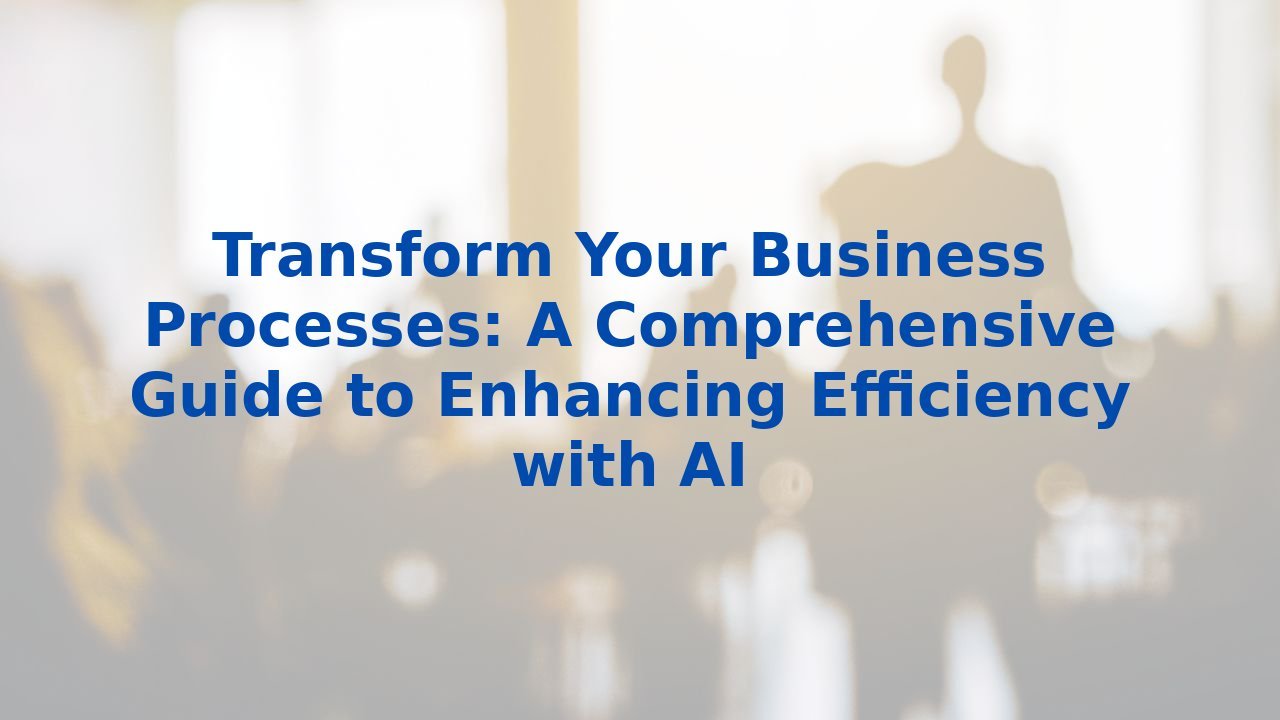Transform Your Business Processes: A Comprehensive Guide to Enhancing Efficiency with AI
Transform Your Business Processes: A Comprehensive Guide to Enhancing Efficiency with AI
In the dynamic landscape of today’s business world, organizations strive for efficiency to maintain their competitive edge. One of the most compelling strategies to achieve this aim is to harness the capabilities of Artificial Intelligence (AI) in enhancing business processes. This guide will outline how AI can not only elevate general business processes but also foster an environment conducive to long-term success.
Understanding Business Process Improvement
Business Process Improvement (BPI) is fundamental for any organization looking to optimize operations. It involves assessing and refining existing business processes to boost efficiency, cut costs, and heighten overall performance. Traditional approaches to BPI often hinge on manual data analysis and employee interviews, which, while valuable, can be labor-intensive and laden with the potential for human error.
The Role of AI in BPI
AI shines when it comes to analyzing vast amounts of data, revealing patterns that may elude human analysts. This capability for predictive analysis empowers businesses to foresee challenges and recognize opportunities before they materialize. By taking a proactive stance rather than a reactive one, organizations can refine workflows, optimize resource allocation, and bolster their strategic planning.
Process Discovery and Mapping
A pivotal component of BPI is process discovery and mapping, which can be significantly enhanced through AI. Employing techniques such as process mining and pattern recognition, AI helps uncover a company’s existing operations. This discovery phase is invaluable for identifying latent inefficiencies and bottlenecks that might otherwise go unrecognized. By swiftly analyzing comprehensive operational data, AI provides a holistic view of an organization’s processes, making the invisible visible.
Process Automation
One of the standout advantages of integrating AI into BPI is process automation. AI technologies can take over repetitive and tedious tasks such as data entry and transaction processing, allowing human resources to dedicate their talents to strategic and creative pursuits. Beyond mere task execution, AI can even facilitate complex decision-making processes, substantially speeding up operations while minimizing human error.
Supply Chain Optimization
In the realm of supply chain management, AI is a game-changer. By forecasting demand trends accurately and suggesting optimized stock levels, AI minimizes warehousing costs and alleviates supply chain bottlenecks. Furthermore, AI’s prowess extends to route optimization, significantly enhancing delivery speed while reducing transportation expenses and environmental footprints.
Continuous Improvement
Continuous improvement is essential for sustaining competitive advantage, and AI fosters this by supplying ongoing feedback and data-driven insights. Organizations leveraging AI can achieve sustained enhancements through iterative optimization processes. These AI-driven feedback loops enable businesses to align their strategies with evolving objectives and industry standards.
Benefits of AI Integration
The infusion of AI into BPI brings a wealth of benefits:
- Improved Efficiency: With AI automating mundane tasks, employees can concentrate on high-value initiatives that drive growth and innovation.
- Cost Reduction: AI enhances efficiencies by eliminating waste and optimizing resource utilization, translating into significant financial savings.
- Enhanced Decision-Making: Businesses gain access to accurate, timely insights thanks to advanced analytics, which enable smarter, data-driven decisions.
- Scalability: AI allows organizations to expand or handle greater transaction volumes without necessitating proportional increases in workforce or resources.
- Customer Satisfaction: With AI improving personalization, response times, and accuracy, customer experience sees measurable enhancement.
Training Employees for AI
Despite the tremendous potential of AI, its efficacy hinges on competent human interaction. Training employees to effectively engage with AI involves several key areas:
- Understanding AI Tools: Employees must grasp how AI technologies function and how they integrate into existing workflows.
- Data Analysis Skills: Basic data analysis skills are crucial for interpreting AI-generated insights, enabling employees to make informed decisions.
- Adaptability: Encouraging openness to new technologies ensures smooth transitions into AI-enhanced environments.
- Continuous Learning: Cultivating a culture of ongoing learning about AI technologies empowers employees to stay abreast of innovations.
Conclusion
To sum it up, the strategic integration of AI into business process improvement represents a transformative approach of exceptional value. From refining existing workflows to offering continuous improvement, AI elevates organizational efficiency, streamlines operations, and supports decision-making. Training employees plays a pivotal role in fully harnessing the power of AI. As companies embrace the complexities of digital transformation, activating the potential of AI in their processes becomes a critical pathway to enduring success. For organizations eager to deepen their understanding and implementation of AI, exploring comprehensive training programs is an essential step forward.
For more insights and resources on enhancing your workforce’s AI skills, consider visiting the Complete AI Training Homepage where you can find various training programs tailored to your organization's needs.



